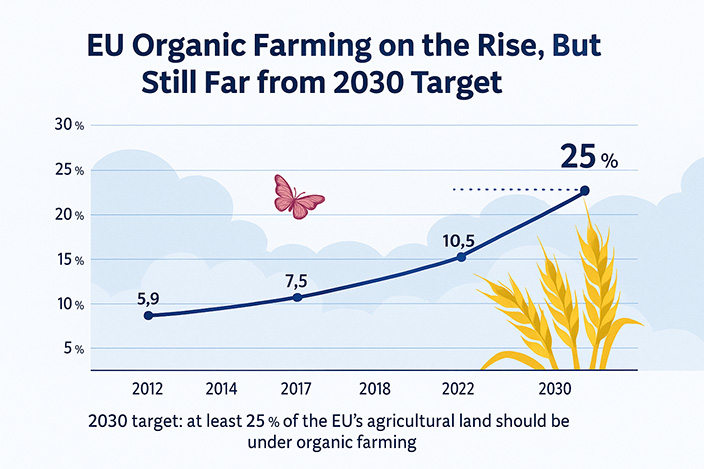Institute for Sustainable Development – North Macedonia | 20 June 2025
A decade of gradual progress in organic farming across the European Union is not enough to mask a concerning reality: the EU is falling significantly behind on its own environmental targets. According to data from Eurostat, the percentage of utilised agricultural area under organic farming in the EU reached just 10.5% in 2022—a modest improvement from 5.9% in 2012, but still far off from the 25% target set for 2030 under the European Green Deal and Farm to Fork strategy.
The numbers speak for themselves: in ten years, the EU has managed to increase organic farmland by just 4.6 percentage points. At this pace, the 25% target by 2030 is more aspiration than achievable reality. According to the Institute for Sustainable Development analysis, this underwhelming growth reveals critical weaknesses in both EU-level strategies and national implementation efforts. The rate of progress does not match the scale of the environmental crisis or the urgency with which sustainable practices must be adopted.

Despite being a global leader in climate rhetoric, the EU seems to be struggling to turn its commitments into action. The slow expansion of organic farming is a reflection of deeper systemic issues: persistent subsidies for intensive farming models, slow bureaucratic procedures for certification, insufficient incentives for small-scale farmers, and a lack of robust consumer education and demand.
According to the Institute for Sustainable Development analysis, the current pace of transformation fails to reflect the EU’s proclaimed ambition of leading a green transition. A more coherent and binding action plan is needed. One that not only sets targets but also enforces real structural change through reform of the Common Agricultural Policy (CAP), greater financial support for organic conversion, and stronger engagement with farmers and consumers alike.
We also stress the importance of integrating candidate countries like North Macedonia into these efforts. As part of our EU integration process, aligning with the Green Deal objectives is not just a requirement but a shared responsibility. However, if the Union itself does not deliver on its own benchmarks, what message does that send to aspiring member states?
A more aggressive and transparent roadmap is urgently needed. The next few years will be decisive—not only for the health of Europe’s soils and ecosystems but for the credibility of its sustainability vision.
